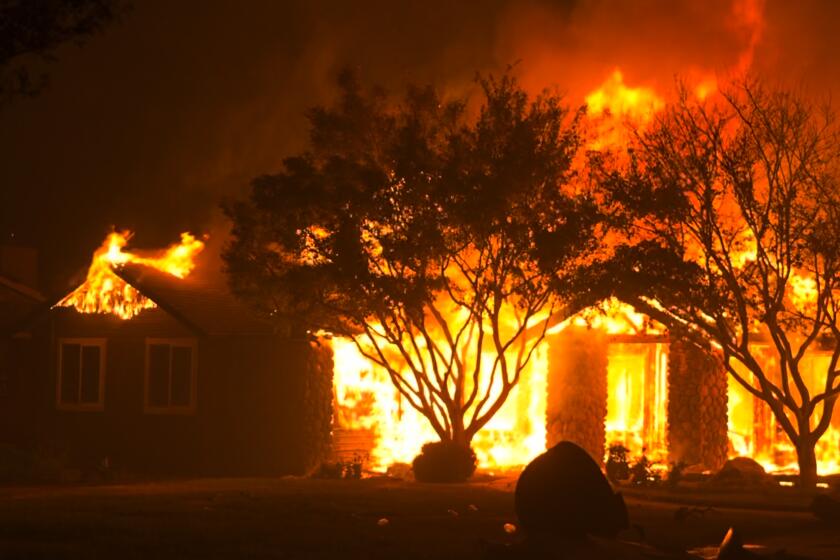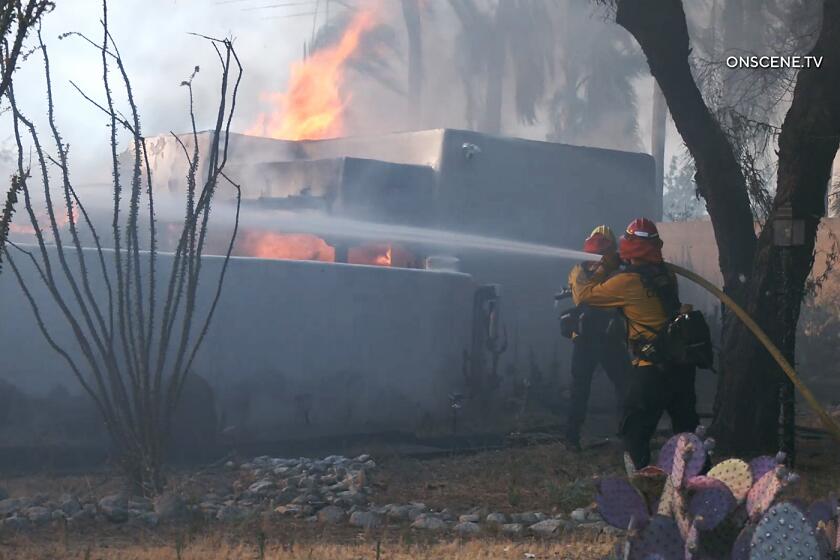Maid Reportedly Told of Faulty Heater : Safety: Hotel repairman was dispatched, but Mission Valley guest died in the same room less than a month later.
Less than a month before a faulty gas heater caused the death of a Canadian volleyball player in Room 329 of the Mission Valley Inn, a maid reported to the hotel management that she smelled gas in the room, an investigator close to the case said.
Sgt. Frank Barone, an investigator with the San Diego Metro Arson Strike Team, said maintenance records for Room 329 show that, on Dec. 9, after the maid reported her suspicions, a hotel maintenance employee was dispatched to fix the room’s malfunctioning gas wall heater.
“The report shows they fixed it,” said Barone, adding that the workman wrote on the form that the repairs were completed the same day. “I assume that they fixed it.”
After the workman’s visit, Barone said, the room was unoccupied until Cory Louis Korosi, 21, and Henry Kim Wong, 20, checked in Dec. 26. Six days later, on New Year’s Day, Korosi was found dead and Wong unconscious as a result of carbon monoxide poisoning that authorities ruled was a result of a lint-clogged heater.
San Diego County Deputy Dist. Atty. Dan Lamborn said Wednesday that his office has decided the circumstances of the Korosi death do not meet the stringent requirements that define gross criminal negligence. Therefore, he said, his office will not file criminal charges against the owner of the 210-room hotel, Atlas Hotels.
“Now, civilly speaking, there are going to be some happy attorneys out there,” Lamborn added, referring to the possibility that Korosi’s family may file a wrongful-death suit. “I would say that an attorney is going to have an easy time, from the facts that I know, establishing that there was some negligence there. . . . Somebody’s going to get a chunk of Atlas Hotels. That may become a Canadian company before too long.”
Reached at his home in Calgary on Wednesday, Dwayne Korosi, the father of the dead athlete, said he and his wife are still considering filing suit, but have not yet selected a lawyer. Korosi said the family of Wong, who defied doctors’ predictions when he emerged from a coma to make a stunning recovery, is not going to take legal action.
Korosi and Wong, both members of the Southern Alberta Institute of Technology men’s volleyball team, were in San Diego with their team to play a series of exhibition games. After they were discovered New Year’s Day, city building inspectors checked heaters throughout the hotel and closed 36 rooms where heaters were malfunctioning.
Within a week, Atlas had repaired 33 of those heaters to the satisfaction of the inspectors. Two of the three rooms that remained closed were among 22 that the hotel is remodeling. The third was Room 329, which was not repaired because it was still being investigated.
Barone said the investigation in which he participated found that hotel management made an effort to respond to maintenance problems as they came up. After the Dec. 9 report, for example, the maintenance man apparently removed and cleaned the heater’s flue and inspected the unit for gas leaks.
“They were trying to keep up,” Barone said, explaining that an investigation of the heater after Korosi’s death found that “it was taken care of very recently. There was some lint in a very crucial portion. . . . But (that) could have happened since” the Dec. 9 repairs.
Asked whether it seemed implausible that a heater could clog over a period of just three weeks, Barone said: “I don’t know the answer. It’s up the hotel to maintain these things. I’m sure there’s going to be a hefty lawsuit, and it’s going to be up to some high-priced attorneys and other people to determine where that thing went faulty in that period of time and why.”
Barone said city building inspectors told him dust and lint problems were typical of wall heaters.
“They said you could (probably) go around to any hotel in San Diego that had that kind of heater, and you’d find similar types of discrepancies. It’s not uncommon for large hotels to have discrepancies in them--dust accumulation, baffles being bent,” Barone said.
Jack Brandais, the spokesman for the city Building Inspection Department, said it is difficult to quantify how widespread a problem the heaters may pose.
“There’s a problem all over the city with gas heaters. That’s why we have deaths every year,” he said. “But, frankly, we don’t know right now how wide a problem this is because we don’t know how many heaters are out there.”
He said a task force created by the San Diego City Council is developing a method to survey local hotels, motels and apartments to see what kind of heaters they use.
“We were surprised with the number of problem heaters at the Mission Valley Inn,” he said. “From everything I’ve been told, if the heaters are properly maintained, they don’t cause a problem. . . . What the task force is trying to do is find ways to make sure that we don’t have any more deaths.”
Among the options before the task force: drafting new city ordinances that would require regular maintenance by hotel and motel owners, as well as landlords. The city Housing Code now requires that hotels maintain their rooms in safe condition, but does not specify how often they must inspect them.
Officials at the city Building Inspection Department have said that, if such new ordinances were passed, they would need more staff to enforce them. The department now inspects only hotels that are under construction or those about which they receive specific complaints.
But Lamborn, the deputy district attorney, said that, even if a new ordinance were left unenforced, it could still better enable his office to press charges.
“If we have an ordinance that they violate, then we can go in on an involuntary manslaughter charge,” he said. Without an ordinance, he said, a criminal case must be based on proving gross negligence--a term that is strictly defined in the law.
“It must appear that the death was not the result of inattention, mistaken judgment or misadventure but (was) the natural and probable result of an aggravated, reckless or grossly negligent act,” Lamborn said, reading from definitions listed in a jury instruction booklet.
“Making a mistake doesn’t qualify,” he said, explaining the law in his own words. “Inattention doesn’t qualify. It has to be something that is above and beyond, crying out as negligence--like you’re aware but you turn your head and say, ‘I don’t care.’ ”
More to Read
Sign up for Essential California
The most important California stories and recommendations in your inbox every morning.
You may occasionally receive promotional content from the Los Angeles Times.






